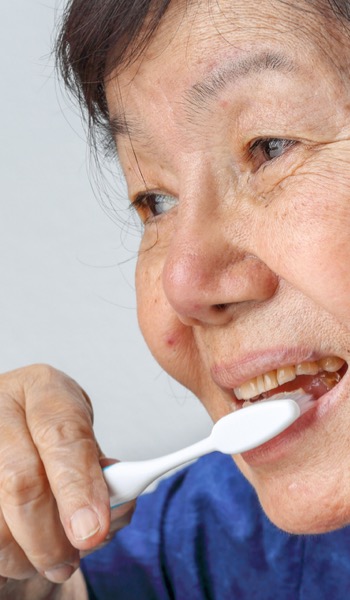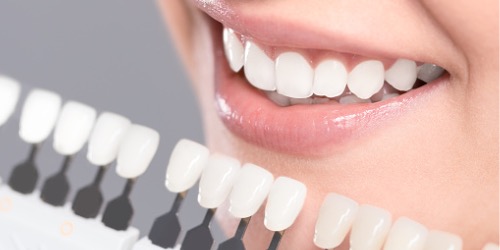Open wide
In Families
Follow this topic
Bookmark
Record learning outcomes
 The Oral Health Foundation is calling for the government to take action and improve the provision of oral health care for older people, especially as people are living longer. In April 2019, a study published in The Journal of Gerondontology revealed that poor oral health is independently associated with frailty in later life. The research found that elderly people with muscular weakness, sudden weight loss or impaired mobility are substantially more prone to oral health issues.
The Oral Health Foundation is calling for the government to take action and improve the provision of oral health care for older people, especially as people are living longer. In April 2019, a study published in The Journal of Gerondontology revealed that poor oral health is independently associated with frailty in later life. The research found that elderly people with muscular weakness, sudden weight loss or impaired mobility are substantially more prone to oral health issues.
“The first problems to occur are often because of a loss of dexterity,” says Dr Nigel Carter, chief executive of the Oral Health Foundation. “Limited mobility, no matter how small, can have an extremely large effect on our ability to care for our own health. In terms of oral health, this means effective toothbrushing becomes much harder. Balanced nutrition also becomes more difficult. This often leads to more frequent sugar consumption.”
The way to better oral care
The Faculty of Dental Surgeons of the Royal College of Surgeons’ report on Improving Older People’s Health, published in August 2017, revealed that maintaining good oral health can become more difficult in old age. “Whereas dental treatment for older people used primarily to involve providing dentures to those who had lost all their teeth, many older people now require ongoing regular maintenance of heavily restored teeth, which creates new challenges for dentists,” says the report. “For example, brushing twice a day may not be easy for someone who has a long-term health condition, reduced dexterity or who has dementia and may be resistant to care. Furthermore, one unwanted effect of many regularly prescribed medications is dry mouth, which increases the risk of tooth decay and oral infections, as it reduces the protective effect of saliva, which has anti-microbial properties.”
Many older people now require ongoing regular maintenance of heavily restored teeth
When elderly customers are in the pharmacy for health advice and medicines, they may ask for support with oral health problems. “Many people visiting a pharmacy are looking for pain relief and medication to rid themselves of toothache, mouth ulcers and other areas of discomfort in the mouth and jaw,” says Dr Carter. “By talking with a customer about their problem, you will be able to gauge how persistent the problem is, how serious it could be and whether you might need to recommend your client attends a dental practice. Make sure you explain to each customer that pain relief is not a treatment and encourage them to make an appointment with their dentist.”
Some elderly customers may struggle to visit a local dentist for physical, practical or financial reasons, and even those living in care homes may find it difficult to access dental care. The Care Quality Commission report Smiling Matters: Oral Health Care In Care Homes, published in June 2019, revealed that most care homes had no policy to promote and protect residents’ oral health and nearly half were not training staff to support daily oral healthcare.
“The availability of dentists needs to be urgently addressed,” says Dr Carter. “There are also major barriers with transporting elderly people to the dentist, while financial difficulties often become more common. Worryingly, there is also poor knowledge and a lack of awareness of oral health among carers. All of these factors create an urgent need to move towards a more effective system for oral healthcare of our elderly. Giving people access to dental services in hospitals and residential homes, as well as for those still living in their own homes, is a real and viable option. Oral health training for carers also should take a greater priority.”
Advising on oral care regimens
There are many ways in which pharmacy teams can advise customers of all ages on better oral care. Dr Carter recommends that you advise customers to brush twice a day with fluoride toothpaste, limit sugary foods and drinks to mealtimes and chew sugar-free gum after meals. “Smoking makes gum health worse by increasing the amount of bacterial plaque produced and starving the gums of oxygen,” he says. “So make sure you convey the message: ‘If you smoke, give up now.’ If a client thinks they might have bad gum health, urge them to visit a dentist immediately for a thorough check-up of their teeth and gums.”
According to GSK, tooth sensitivity affects as many as one in three people and research indicates that 44 per cent of sufferers adjust their brushing technique to avoid sensitive areas, which can potentially lead to further oral health problems.
“Sensitivity and gum health are two very important issues in oral care,” says Dr Soha Dattani, director of scientific and professional affairs at GSK. “We know that in many patients the two problems can co-exist. About 50 per cent of sensitivity sufferers globally also experience gum/gingival problems. We also know that patient compliance with an appropriate twice-daily oral care regime is low.”
Standard brushing alone cleans only 60 per cent of the tooth’s surface
According to GSK, which makes the Sensodyne brand, erosive tooth wear (ETW) is the third most commonly observed oral condition, affecting up to 30 per cent of European adults. Despite this, it is not routinely screened or monitored as part of the standard dental examination. Reports show that a snacking culture and the popularity of fresh fruit and fruit juices has significantly increased the risk of developing the condition, especially when these are consumed outside meals. “Our modern snacking culture, coupled with an ageing population who retain their teeth for longer, means that ETW is a rapidly increasing risk,” says Dr Dattani. “As ETW may have considerable aesthetic, functional and financial implications, there is a need to protect the patient and the professional through early identification and patient counselling for prevention.”
Teeth whitening - the latest
NHS guidance stresses that teeth whitening should be carried out only by a dentist or another regulated dental professional and that DIY home teeth whitening kits may carry risks. Yet, according to a Euromonitor report on oral care in the UK in June 2019, the whitening category grew quickly in 2018.
In February 2019, a pilot study in the British Dental Journal assessed the safety and efficacy of five OTC bleaching products available from pharmacies in the UK. This study suggests that non-hydrogen peroxide OTC products may damage enamel and induce sensitivity, while some have less of a whitening effect on teeth than saline. “Some of the products contain ingredients such as sodium chlorite, which can soften and affect the hardness of tooth enamel,” says Dr Richard Marques of Wimpole Street Dental. “These products potentially damage the teeth irreversibly. We therefore always recommend that patients have their teeth whitened only with a dentist.”
 Charcoal toothpastes, which claim to whiten teeth naturally, are a growing trend. However, there are concerns that these can damage tooth enamel, especially when used long term.
Charcoal toothpastes, which claim to whiten teeth naturally, are a growing trend. However, there are concerns that these can damage tooth enamel, especially when used long term.
“There is no evidence to suggest that charcoal toothpastes are effective in brightening the shade of our teeth,” says Dr Carter. “Some charcoal toothpastes can cause more harm than good. Toothpaste needs to contain 1,350 to 1,500 parts per million fluoride to actively protect teeth from tooth decay, but many of the toothpastes that contain activated charcoal fall well below this level and are putting users at an increased risk of tooth decay. Any toothpaste that claims to whiten teeth will need to have abrasive ingredients – in the case of charcoal toothpastes, extremely harsh, abrasive contents.”
Dr Mihir Shah, head dentist at Battersea Park Dental, says whitening products that contain baking soda are also mildly abrasive. “This will remove surface stains from teeth and make them appear whiter, but it won’t change the colour of them,” he says. “Long-term use of these can irreversibly damage tooth enamel. They can also make teeth very sensitive. Seeing a dentist for whitening is the only way to be sure you are not damaging your teeth.”
The reasons for interdental approaches
In September 2018, the Oral Health Foundation stressed that interdental cleaning before brushing is the best way to clean teeth effectively. Research in The Journal of Periodontology found that flossing loosens bacteria and food debris from between the teeth, which makes brushing much more successful at removing plaque.
“Many people don’t know that standard brushing alone cleans only 60 per cent of the tooth’s surface, which leaves the remaining surfaces at risk of a build-up of bacteria and plaque,” says Elaine Tilling, head of clinical education for TePe. “Moreover, gum disease is extremely common, affecting three out of every four adults over the age of 35 in the UK. This indicates a clear need for greater awareness on how to tackle the issue of poor oral health. Use of interdental brushes has been shown to be the most efficient way to remove plaque between the teeth.”
P3pharmacy category panel
 Lila Thakerar, Shaftesbury Pharmacy, Harrow
Lila Thakerar, Shaftesbury Pharmacy, Harrow
“Oral care is a key category for us. People are much more aware of dental hygiene nowadays. They tend to see their dentist more often and are told what products to use. Our most common query is how to treat bleeding gums. Listerine sells well, dental floss is popular and we sell lots of interdental brushes. We are are next door to a busy dental practice, so we get lots of dental prescriptions and recommendations. We have four large gondolas at the front of our store for maximum impact. People need to see the products to encourage impulse buys.”
 Jaimini Modi, locum, Harrow, mainly for Clinidirect
Jaimini Modi, locum, Harrow, mainly for Clinidirect
“I don’t get many patients asking for oral healthcare products, but we do receive a substantial amount of dental prescriptions, for sodium fluoride toothpastes and mouthwashes in particular, and we are then able to provide further advice regarding their correct use. In addition, some patients come in and ask for Corsodyl mouthwashes for gum disease. In terms of improving sales, we could introduce promotions on selected mouthwashes and toothpastes and ensure staff are promoting good oral health.”
 Mital Thakrar, Well Pharmacy, Birmingham
Mital Thakrar, Well Pharmacy, Birmingham
“Oral care has always been a popular reason to visit local pharmacies and the opportunity is massive with the new emphasis put on healthcare professionals by NICE and PHE. There is also an opportunity to recommend patients see their dentists regularly and to encourage healthy brushing. Talking customers through lifestyle factors that contribute to poor oral health and improvements that can be made is a brilliant method when consulting. It is important to stock a range of products, including brands that are widely advertised.”
